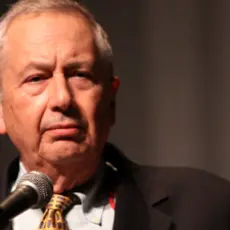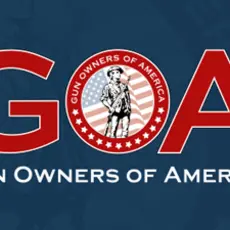Donald Trump has spent his presidential campaign parroting things that he “hears” from others, often with no regard to the reliability of the source or the extremism of his role models.
This afternoon, Trump created yet another controversy when he suggested that violence might be an option if Hillary Clinton is allowed to nominate Supreme Court justices.
If Clinton “gets to pick her judges,” he said, there’s “nothing you can do.”
“Although the Second Amendment people, maybe there is,” he added. “I don’t know.”
While Trump may have concocted this idea all on his own, his comment sounds like it could have come straight from the mouth of a certain segment of anti-government, anti-gun-regulation extremists.
A key proponent of the idea that elected officials and judges must always be on the lookout for armed citizens taking matters into their own hands is Larry Pratt, the executive director emeritus of Gun Owners of America, who was a key figure in the rise of the militia movement in the 1990s.
Back in May, Pratt expressed basically the same sentiment as Trump, saying that conservatives might have to resort to the “bullet box” to reclaim the courts if they can’t “solve this matter at the ballot box.”
Pratt made similar comments in March about President Obama’s nominee to the Supreme Court, saying, “the Second Amendment is all about people like Judge Garland, so there is a limit to how far he can go.”
As Brian wrote at the time, this was part of a long pattern for Pratt:
Pratt has a history of saying that the Second Amendment is meant to give people the right to assassinate or intimidate leaders they don’t like.
In Pratt’s view, the Second Amendment was created in order to instill in politicians “a healthy fear” in “the back of their minds” that they will be assassinated so “they’ll behave.”
He explicitly told Rep. Carolyn Maloney, D-N.Y., that she “should do her job in constant trepidation,” knowing that if she tries “to disarm Americans the way the British crown tried 240 years ago, the same sovereign people who constituted this government using the cartridge box someday may need to reconstitute it, as clearly anticipated by the Declaration of Independence.”
When Alan Colmes asked him if he really does believe that politicians “should have a healthy fear of being shot,” Pratt replied: “Sure, that’s what the Second Amendment is all about. ”
The sentiment of “Second Amendment remedies” is essential to the militia movement’s view of freedom – that they get to impose their own idea of liberty on everybody else using the threat of violent force.
Mike Vanderboegh, who ran a militia group called the Three Percenters, used this talking point at a 2014 rally against new gun regulations in Washington state, saying that the gun rights movement may need to fall back on “Second Amendment remedies.”
Trump has already shown his willingness to embrace this kind of anti-government extremism with his courting of Sheriff David Clarke, a frequent Fox News guest who is involved with the Oath Keepers and other insurrectionist groups.
The language is nothing new for Trump’s campaign, either. One of his advisers, Roger Stone, recently said that people should protest in the streets if Trump is defeated in November, predicting that it could be a “ bloodbath.” In the past, Stone has said that Hillary Clinton should be “executed.” Another adviser said last month that “Hillary Clinton should be put in the firing line and shot for treason.”
The violent words were all his own, but they followed a well-worn path.







